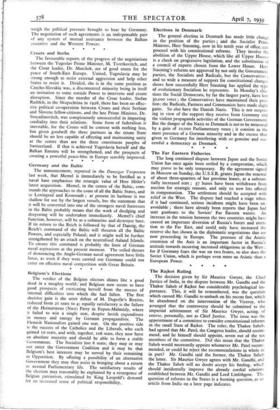The Rajkot Ruling The decision given by Sir Maurice Gwyer,
the Chief Justice of India, in the dispute between Mr. Gandhi and the Thakor Saheb of Rajkot has considerable psychological im- portance. This, it will be remembered, was the question which caused Mr. Gandhi to embark on his recent fast, which he abandoned on the intervention of the Viceroy, who arranged that the controversy should be submitted to the impartial arbitrament of Sir Maurice Gwyer, acting, of course, personally, not as Chief Justice. The issue was the appointment of a committee to consider constitutional reforms in the small State of Rajkot. The ruler, the Thakor Saheb, had agreed that Mr. Patel, the Congress leader, should recom- mend, and he himself should appoint, seven out of the ten members of the committee. Did this mean that the Thakor Saheb would necessarily appoint whomever Mr. Patel recom- mended, or could he reject the recommendations in whole or in part? Mr. Gandhi said the former, the Thakor Saheb the latter. Sir Maurice Gwyer agrees with Mr Gandhi, and the Thakor Saheb will no doubt accept his finding, which should incidentally improve the already cordial relations established between Mr. Gandhi and Lord Linlithgow. The question of reforms in the States is a burning question, as an article from India on a later page indicates.










































 Previous page
Previous page